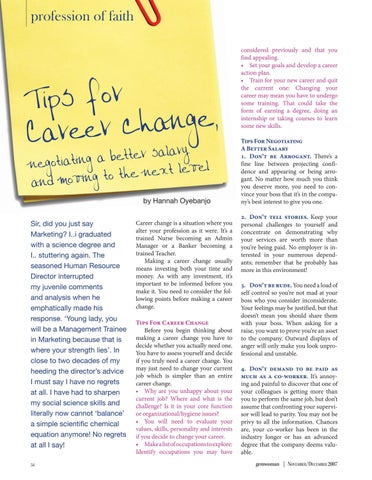profession of faith considered previously and that you find appealing. • Set your goals and develop a career action plan. • Train for your new career and quit the current one: Changing your career may mean you have to undergo some training. That could take the form of earning a degree, doing an internship or taking courses to learn some new skills.
by Hannah Oyebanjo Sir, did you just say Marketing? I..i graduated with a science degree and I.. stuttering again. The seasoned Human Resource Director interrupted my juvenile comments and analysis when he emphatically made his response. ‘Young lady, you will be a Management Trainee in Marketing because that is where your strength lies’. In close to two decades of my heeding the director’s advice I must say I have no regrets at all. I have had to sharpen my social science skills and literally now cannot ‘balance’ a simple scientific chemical equation anymore! No regrets at all I say! 54
Career change is a situation where you alter your profession as it were. It’s a trained Nurse becoming an Admin Manager or a Banker becoming a trained Teacher. Making a career change usually means investing both your time and money. As with any investment, it’s important to be informed before you make it. You need to consider the following points before making a career change. Tips For Career Change Before you begin thinking about making a career change you have to decide whether you actually need one. You have to assess yourself and decide if you truly need a career change. You may just need to change your current job which is simpler than an entire career change. • Why are you unhappy about your current job? Where and what is the challenge? Is it in your core function or organizational/hygiene issues? • You will need to evaluate your values, skills, personality and interests if you decide to change your career. • Make a list of occupations to explore: Identify occupations you may have
Tips For Negotiating A Better Salary 1. Don’t be Arrogant. There’s a fine line between projecting confidence and appearing or being arrogant. No matter how much you think you deserve more, you need to convince your boss that it’s in the company’s best interest to give you one. 2. Don’t tell stories. Keep your personal challenges to yourself and concentrate on demonstrating why your services are worth more than you’re being paid. No employer is interested in your numerous dependants; remember that he probably has more in this environment! 3. Don’t be rude. You need a load of self control so you’re not mad at your boss who you consider inconsiderate. Your feelings may be justified, but that doesn’t mean you should share them with your boss. When asking for a raise, you want to prove you’re an asset to the company. Outward displays of anger will only make you look unprofessional and unstable. 4. Don’t demand to be paid as much as a co-worker. It’s annoying and painful to discover that one of your colleagues is getting more than you to perform the same job, but don’t assume that confronting your supervisor will lead to parity. You may not be privy to all the information. Chances are, your co-worker has been in the industry longer or has an advanced degree that the company deems valuable. gemwoman | November/December 2007













